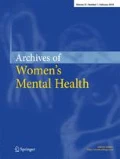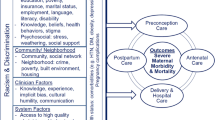Abstract
It is reported that the rates of perinatal depressive disorders are high in ethnic minority groups from non-English speaking countries. However, very few studies have compared the prevalence of positive screening for postpartum depression (PPD) in minority communities living in an inner city. The goal of this study is to determine the prevalence and the predictors of positive screening for postpartum depression in minority parturients in the South Bronx. The study is a chart review of 314 minority parturients, Black or Hispanic, screened for postpartum depression using the Edinburgh Postnatal Depression Scale (EPDS) tool. The overall prevalence of a positive EPDS screen among Black and Hispanic women was similar, 24.04 and 18.75%, respectively. The Black immigrant cohort had comparable positive screens with 23.81 as African Americans. Hispanic women born in the USA had the least prevalence of positive screens, 7.14%, and those who moved from the Dominican Republic and Puerto Rico had a prevalence of 17.24% of positive screens. The women who immigrated from Mexico, Central America, or South America had the highest prevalence of positive screens for PPD, 32.26%. As to the socioeconomic status (SES), there was a significant increase of 27.04 vs. 13.95% (P < 0.019) in positive screens for PPD for the unemployed mothers. Overall, Black and Hispanic parturients had similar rates of positive screens for PPD. Among the Hispanic women, immigrants had higher rates of positive screens, with those from Mexico, Central, and South America as the highest. The hospital experience did not affect the rates of positive screens. Neither did the SES with one exception; those unemployed had the higher rates of positive screens.
Similar content being viewed by others
References
Adouard F, Glangeaud-Freudenthal NM, Golse B (2005) Validation of the Edinburgh Postnatal Depression Scale (EPDS) in a sample of women with high-risk pregnancies in France. Arch Womens Ment Health 8(2):89–95
Alvarado R, Jadresic E, Guajardo V, Rojas G (2015) First validation of a Spanish-translated version of the Edinburgh Postnatal Depression Scale (EPDS) for use in pregnant women. A Chilean study. Arch Womens Ment Health 18(4):607–612
Alvarado-Esquivel C, Sifuentes-Alvarez A, Salas-Martinez C (2014) The use of the Edinburgh Postpartum Depression Scale in a population of teenager pregnant women in Mexico: a validation study. Clin Pract Epidemiol Ment Health. doi:10.2174/1745017901410010129.eCollection2014
Baker L, Oswalt K (2008) Screening for postpartum depression in a rural community. Community Ment Health J 44(3):171–180
Callister L, Beckstrand RL, Corbett C (2011) Postpartum depression and help seeking behaviors in immigrant Hispanic women. JOGNN: J Obst Gynecol Neo Nurs 40(4):440–449. doi:10.1111/j.15526909.2011.01254.x
Cox JL, Holden JM, Sagovsky R (1987) Detection of postnatal depression. Development of the 10-item Edinburgh Postnatal Depression Scale. Br J Psychiatry Jun 150:782–786
Gress-Smith JL, Luecken LJ, Lemery-Chalfant K, Howe R (2012) Postpartum depression prevalence and impact on infant health, weight, and sleep in low-income and ethnic minority women and infants. Matern Child Health J 16(4):887–893
Hanington L, Ramchandani P, Stein A (2010) Parental depression and child temperament: assessing child to parent effects in a longitudinal population study. Infant Behav Dev 33(1):88–95. doi:10.1016/j.infbeh.2009.11.004
Husain N, Cruickshank K, Husain M, Khan S, Tomenson B, Rahman A (2012) Social stress and depression during pregnancy and in the postnatal period in British Pakistani mothers: a cohort study. J Affect Disord 140(3):268–276
Kabir ZN, Nasreen HE, Edhborg M (2014) Intimate partner violence and its association with maternal depressive symptoms 6–8 months after childbirth in rural Bangladesh. Glob Health Action 7:24725
Khalifa DS, Glavin K, Bjertness E, Lien L (2015) Postnatal depression among Sudanese women: prevalence and validation of the Edinburgh Postnatal Depression Scale at 3 months postpartum. Int J Women’s Health 7:677–684. doi:10.2147/IJWH.S81401
Le HN, Perry DF, Ortiz G (2010) The Postpartum Depression Screening Scale—Spanish version: examining the psychometric properties and prevalence of risk for postpartum depression. J Immigr Minor Health 12:249–258
Letourneau NL, Dennis C, Benzies K, Duffett-Leger L, Stewart M, Tryphonopoulos PD, Este D, Watson W (2012) Postpartum depression is a family affair: addressing the impact on mothers, fathers, and children. Iss Mental Health Nurs 33(7):445–457. doi:10.3109/01612840.2012.673054
Liu CH, Tronick E (2014) Prevalence and predictors of maternal postpartum depressed mood and anhedonia by race and ethnicity. Epidemiol Psychiatr Sci 23(2):201–209. doi:10.1017/S2045796013000413
Lucero N, Beckstrand R, Callister LC, Birkhead A (2012) The prevalence of postpartum depression in Hispanic immigrant women. J Am Acad Nurse Pract 24(12):726–734. doi:10.1111/j.1745-7599.2012.00744.x
Onozawa K, Kumar RC, Adams D, Dore C, Glover V (2003) High EPDS scores in women from ethnic minorities living in London. Arch Womens Met Health 6(2):51–55
Patel V, DeSouza N, Rodrigues M (2003) Postnatal depression and infant growth and development in low income countries: a cohort study from Goa, India. BMJ 88(1):34
Paulson JF, Bazemore SD (2010) Prenatal and postpartum depression in fathers and its association with maternal depression a meta-analysis. JAMA: J Am Med Assoc 303(19):1961–1969. doi:10.1001/jama.2010.605
Rahman A, Iqbal Z, Bunn J, Lovel H, Harrington R (2004) Impact of maternal depression on infant nutritional status and illness: a cohort study. Arch Gen Psychiatry 61(9):946
Shellman LM (2012) Postpartum depression in immigrant Hispanic women: a comparative community sample. All Theses and Dissertations. Paper 3244. Brigham Young University
Spinelli MG, Goetz RR (2011) Symptoms of depression in a minority population of women from an urban obstetrics and gynecology clinic. Gend Med 8(5):320–324
Templeton L, Velleman R, Persaud A, Milner P (2003) The experiences of postnatal depression in women from black and minority ethnic communities in Wiltshire, UK. Ethnic Health 8(3):207–221
Trabold N, Waldrop DP, Nochajski TH, Cerulli C (2013) An exploratory analysis of intimate partner violence and postpartum depression in an impoverished urban population. Soc Work Health Care 52(4):332–350
Yonkers KA, Ramin SM, Rush AJ, Navarrete CA, Carmody T, March D, Heartwell SF, Leveno KJ (2001) Onset and persistence of postpartum depression in an inner-city maternal health clinic system. Am J Psychiatry 158(11):1856–1863
Acknowledgments
The authors would like to thank Ms. Judith Wilkinson, the Medical Librarian at Lincoln Medical, and the Mental Health Center Science Library for providing the reference articles
Author information
Authors and Affiliations
Corresponding authors
Ethics declarations
Conflict of interest
The authors declare that they have no conflict of interest.
Rights and permissions
About this article
Cite this article
Doe, S., LoBue, S., Hamaoui, A. et al. Prevalence and predictors of positive screening for postpartum depression in minority parturients in the South Bronx. Arch Womens Ment Health 20, 291–295 (2017). https://doi.org/10.1007/s00737-016-0695-4
Received:
Accepted:
Published:
Issue Date:
DOI: https://doi.org/10.1007/s00737-016-0695-4



